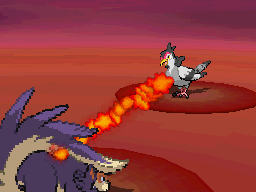Battle effects

|
This article contains old or outdated information, or has not been updated in a while. Please check the content of this article and update it as required. |

Battle effects (Japanese: 戦闘アニメ or せんとうアニメーションRGB battle animations, せんとうエフェクトRSE battle effects), also known as battle animations or battle scene prior to Generation VI, are graphical effects used in Pokémon battles on the core series games and specific spin-off games, such as those in the Pokémon Stadium series and Pokémon Colosseum.
Usage
The visual display of moves used by Pokémon as well as other in-battle effects such as weather and status infliction is caused by the battle effects feature. The effects require a series of sprites or models to make a moving animation, sometimes also using different backgrounds to enhance the scenery. In Pokémon Crystal, the animation of the Pokémon sprites is also considered a battle effect.
Battle effects were given a greater enhancement in Generation V. When a move is used, the camera will zoom in on the affected Pokémon. Sometimes during Double and Triple Battles, the camera will pan outward so that the entire battlefield is seen clearly.
Players have the ability to turn off battle effects as they are not necessary to progress through the game. Battles also progress faster without them. The feature can be turned ON or OFF by accessing the respective setting in the options.
Issues
In most games, the animations of every move begin at a fixed position, which leads to some inconsistencies over how some Pokémon are able to use the attacks—for instance, when a Cyndaquil uses Flamethrower, the flames appear to come out of its eyes.
In Generation III, the animations of Thunder and Thunderbolt may cause a game freeze due to a bug. Turning off battle effects will solve this problem.
In the Japanese Pokémon Red, Green, and Blue, the animations of several moves have more flashes and/or animate faster. Following the "Pokémon Shock" incident, many of these were slowed down or otherwise edited in the international releases of Pokémon Red, Blue, and Yellow, presumably to reduce the risk of epileptic seizures. These edits were also taken into account for the Japanese version of Pokémon Yellow as well.[citation needed] The most noticeable of these is Thunderbolt, though many others were also toned down, such as Body Slam, Hyper Beam, Blizzard, and Surf. When the original Japanese Red, Green, or Blue are played on the Game Boy Tower in the Pokémon Stadium series, these animations are slowed down significantly, more so than in the edits of the core series games. This can occasionally cause brief graphical bugs with some moves, such as Body Slam. This does not affect the Super Game Boy or Game Boy Player, where the animations are shown unedited.[citation needed]
Trivia
- The final battle against Blue in the Generation I games will always show battle effects, even if they are disabled in the options.
In other languages

|
This section is incomplete. Please feel free to edit this section to add missing information and complete it. Reason: Names in other languages in Generation I, II, III |
| |||||||||||||||||||||

|
This game mechanic article is part of Project Games, a Bulbapedia project that aims to write comprehensive articles on the Pokémon games. |